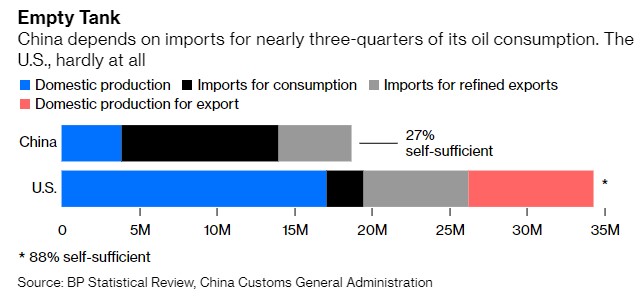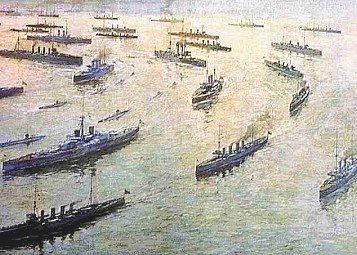
This recent @wsj scoop under the innocuous headline "Secret Chinese Port Project in Persian Gulf Rattles U.S. Relations With U.A.E." has immense implications for the 21st century.
wsj.com/articles/us-ch…
IMO you won't read a better analysis of this than in @bopinion. Thread:
wsj.com/articles/us-ch…
IMO you won't read a better analysis of this than in @bopinion. Thread:
@WSJ @bopinion The report said that US intel agencies had found China was building suspected military facilities at Khalifa, a container port built by Chinese state shipping company COSCO in Abu Dhabi.
Building work was stopped after the US said it risked damaging US-UAE relations.
Building work was stopped after the US said it risked damaging US-UAE relations.
@WSJ @bopinion The story is a big deal because the Persian Gulf is essentially an American lake. The only outside powers with military facilities there are the U.S., plus some pretty small bases from its allies the U.K. and France which were only recently established. 

@WSJ @bopinion But of course there's a deeply uneasy balance of power in the Gulf, with the UAE and Saudi sitting just a few kilometers away from their arch-rival Iran. The Gulf, and particularly the Straits of Hormuz guarding its entry, controls a third of the seaborne oil trade. 

That's in some ways not such a big deal for the U.S. because America has been one of the world's three biggest oil producers since the days of John D. Rockefeller and is essentially self-sufficient in crude.
China, however, depends on imports for about 3/4 of its oil.
China, however, depends on imports for about 3/4 of its oil.

That was the subject of my column last week. China is in the strange situation where its oil supplies -- the lifeblood of its economy and national security, until and unless it manages to decarbonize -- depend on the Pentagon for their security detail:
bloomberg.com/opinion/articl…
bloomberg.com/opinion/articl…
No wonder it's uncomfortable with the status quo and looking to build up its own security capabilities.
In the event of war over the Taiwan Strait, for instance, the U.S. could relatively easily blockade Hormuz or the Straits of Singapore and bring China to its knees.
In the event of war over the Taiwan Strait, for instance, the U.S. could relatively easily blockade Hormuz or the Straits of Singapore and bring China to its knees.
This goes back to points raised in a column with @anjani_trivedi at the time the Ever Given was stuck in the Suez Canal:
Ocean straits are the fulcrums on which history turns, and that's no less the case now in our age of aviation and telecommunication:
Ocean straits are the fulcrums on which history turns, and that's no less the case now in our age of aviation and telecommunication:
https://twitter.com/davidfickling/status/1375237787335553024?s=20
@anjani_trivedi An under-appreciated aspect of 20th century history is the degree to which war was driven by this same dynamic of energy and transport of energy.
Why was there an Anglo-German naval race in the years before World War I?
Why was there an Anglo-German naval race in the years before World War I?

@anjani_trivedi One key reason is that Germany needed imported nitrates in the form of bird droppings to fertilize its scanty agricultural land and feed its population -- but Britain controlled the ocean approaches to Germany. 

@anjani_trivedi Germany lost the war largely because Britain and its allies won the battle for naval supremacy, the fertilizer chain was cut, and the German population succumbed to mass starvation.
@anjani_trivedi (Ironically, German chemist Fritz Haber invented a synthetic process for making ammonium nitrate fertilizer on the eve of war that could be produced domestically. But what was produced was largely used as explosives and it was probably too late to scale up anyway.)
@anjani_trivedi Why did Japan invade Manchuria and then Indonesia? To get hold of their coal and then oil supplies for its resource-poor economy. 

@anjani_trivedi Why did Hitler invade the USSR, a seemingly suicidal move that ultimately turned the course of the war against Nazi Germany? In large part to get to the oil supplies of the Caucasus, because oil-poor Germany was dependent on horses to move much of its military equipment around. 

@anjani_trivedi There is, as @HalBrands wrote yesterday, a global fight over military bases going on between China and the U.S., just out of sight:
bloomberg.com/opinion/articl…
bloomberg.com/opinion/articl…
@anjani_trivedi @HalBrands The fight over Khalifa is, as he says, not so much important in its own right but as a taste of things to come.
There's no reason to think the current peaceful, uncontested state of the high seas is inevitable.
There's no reason to think the current peaceful, uncontested state of the high seas is inevitable.

@anjani_trivedi @HalBrands Since Nelson defeated Napoleon's navy at the Battle of the Nile in 1798, there's been a more or less unbroken Pax Britannica/Pax Americana on the seas which Germany and Japan and the USSR tried and failed to break.
That's a standing strategic threat to their geopolitical rivals.
That's a standing strategic threat to their geopolitical rivals.
And of course we know what happened before that status quo was established, when the seas were contested.
Very romantic and they had some cool hats, but the age of piracy wasn't a good era for commerce:
Very romantic and they had some cool hats, but the age of piracy wasn't a good era for commerce:
(And of course most of that commerce wasn't doubloons but the slave trade and the sugar and tobacco that it fed, but that's another story)
The other key player in this story of course is not the U.S. or China, but the UAE where the alleged base was getting built. @Ibishblog explains the strategic thinking there:
bloomberg.com/opinion/articl…
bloomberg.com/opinion/articl…
@Ibishblog Gulf Arab countries are worried that America will reduce its commitments to the region precisely because of rising security concerns in East Asia, around the Taiwan Strait. So perversely, that's leaving them more open to new, closer relations with China itself. 

@Ibishblog Arch-rival Iran is getting closer to China too, and they want to keep their options open with their major crude customer to ensure that it doesn't end up getting to close to Tehran that they're squeezed out. 

Much of China's foreign policy under Xi Jinping makes most sense as an extension of this long-run strategic thinking.
The vast Belt and Road infrastructure initiative looks like nothing so much as attempts to bypass strategic weakness in the Indian Ocean region.
The vast Belt and Road infrastructure initiative looks like nothing so much as attempts to bypass strategic weakness in the Indian Ocean region.

Port deals in Tanzania, Pakistan, Myanmar and Sri Lanka, a military base in Djibouti at the gates of the Red Sea, rail links across Malaysia and through central Asia, pipelines across Myanmar -- all of it goes to narrow China's strategic disadvantage in the Indian Ocean.
Their increasing anti-piracy activity in the Indian Ocean and attempts to build aircraft carriers and submarines similarly make most sense as a way of giving China a blue-water navy that could fight and perhaps even win a war in the Indian Ocean.
That prospect seems very unlikely from where we are now. Their military disadvantages are simply too great, and they don't have enough allies of consequence. In particular, their growing rivalry with India puts them on the wrong side of the natural hegemon in the Indian Ocean.
China also has pretty poor relations with Indonesia, a country which could be a hegemonic naval power in its own right but has (like Egypt or Panama) never seen much advantage in making that risky play.
This is ultimately the answer to the oft-asked question in Washington of why does the US spend so much diplomatic and military effort on the Middle East. The country that controls the world's energy supplies controls the world, and the US can't risk ceding that to China.
The alarming thing here is that it's often a rising power's attempt to insure itself against naval threats that have ultimately led to war itself -- as with the pre-WWI Anglo-German naval race or Japan's pre-emptive attack on Pearl Harbor.
That's a worrying prospect for the 21st century. (ends)
Small postscript: How does energy transition change this? Surprisingly little in the coming decades IMO. What are probably the two hardest sectors of the civilian economy to decarbonize? Ships and planes. And what do ships and planes run on? Yeaaah. 

You can have nuclear shipping but it's only really suitable for submarines and the biggest ships (China is also dependent on imports from Kazakhstan, Canada etc for its uranium). For high-performance aircraft there's no prospect of anything that could compete with jet fuel.
Military planning is *extremely* conservative and until there are zero-carbon alternatives that are plainly better than the oil-powered ones, the world's navies and air forces will run on hydrocarbons.
• • •
Missing some Tweet in this thread? You can try to
force a refresh






